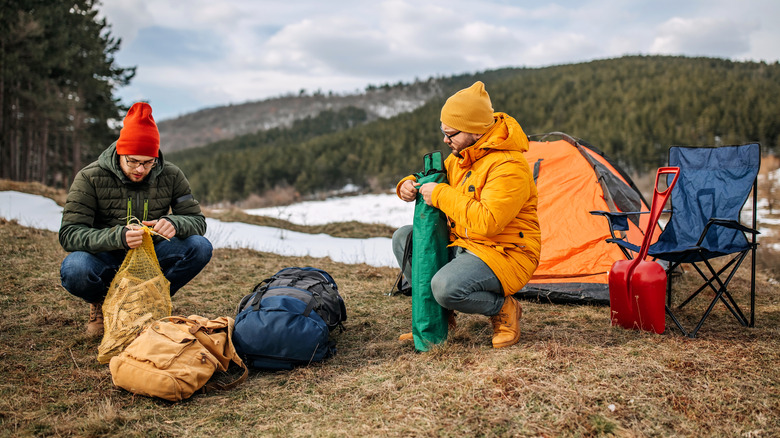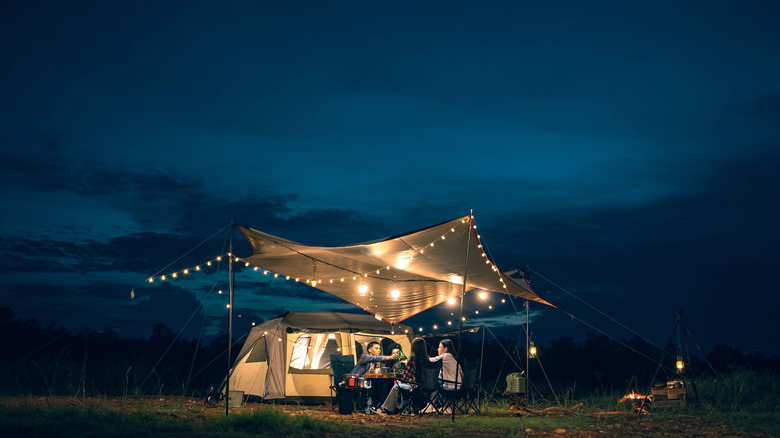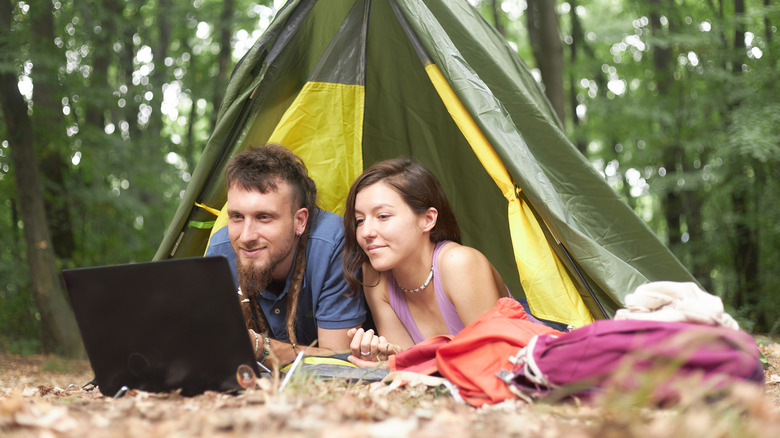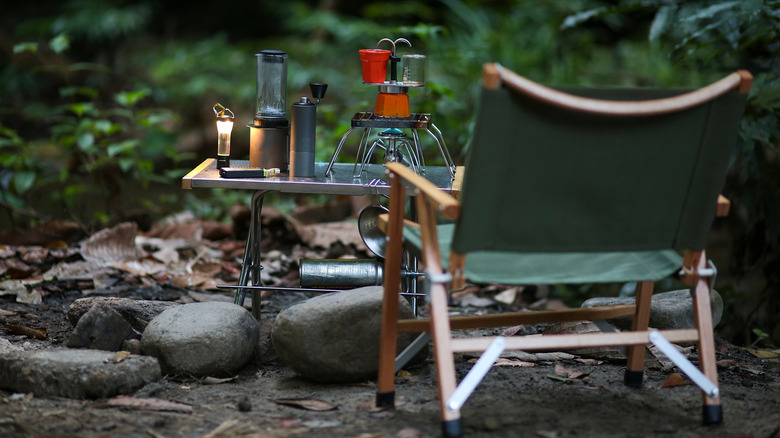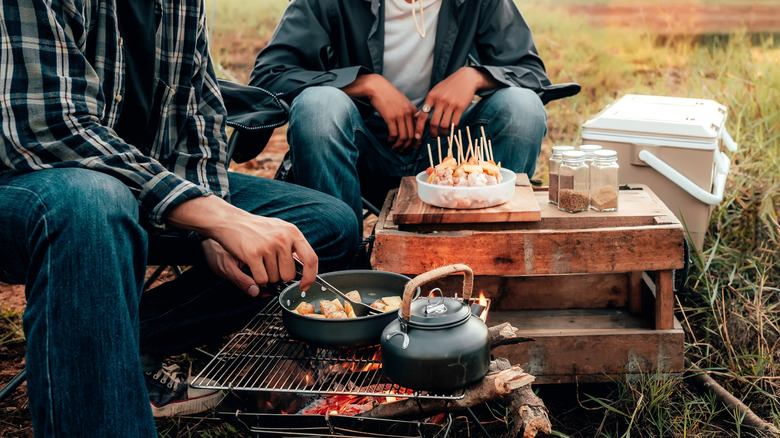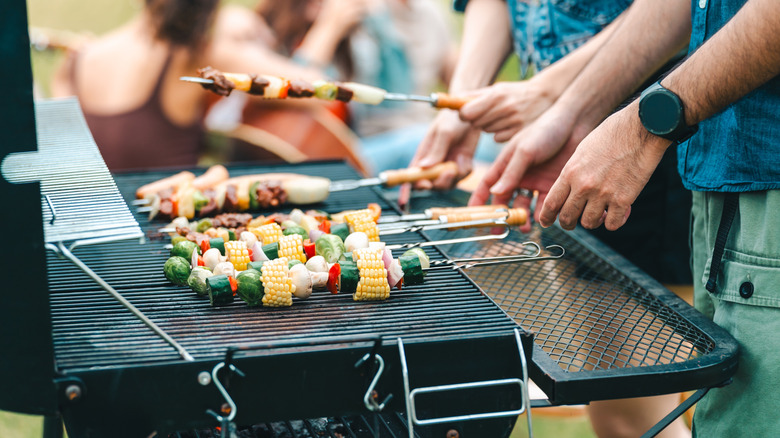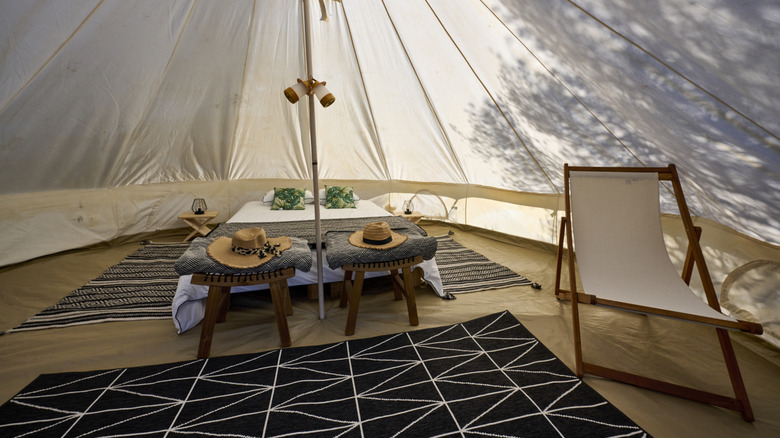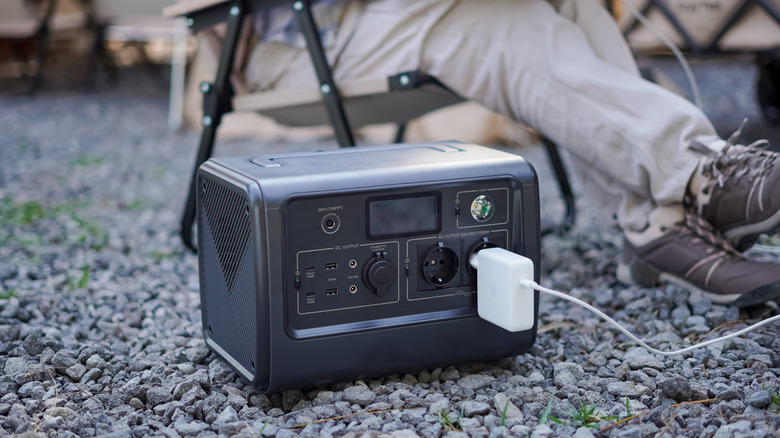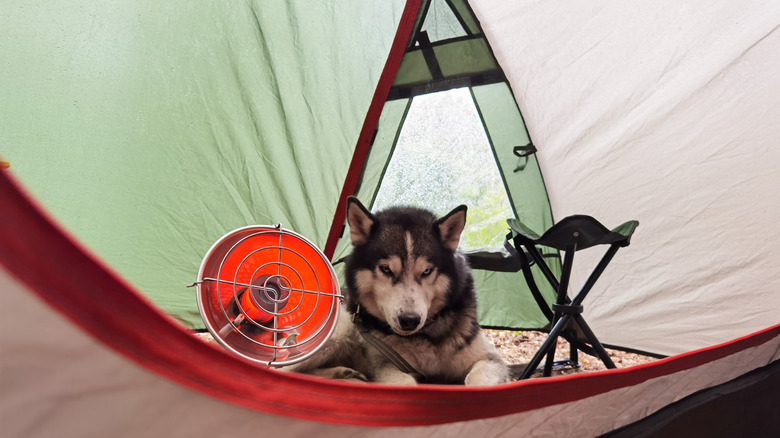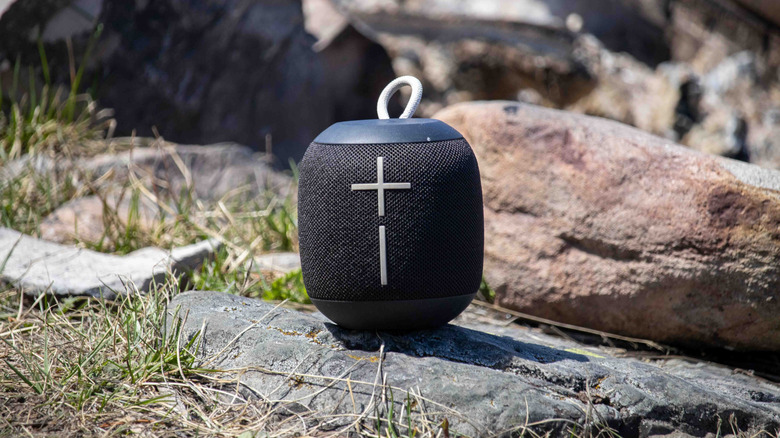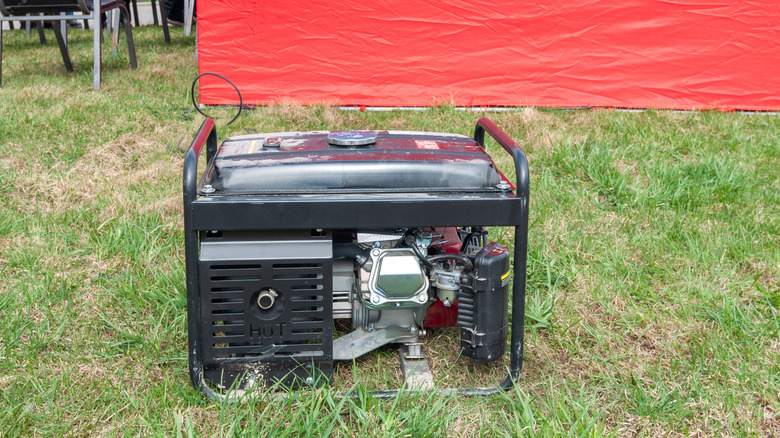10 Camping Gear And Tech Items You Should Avoid Spending Your Money On
We may receive a commission on purchases made from links.
Whether you're a seasoned tenting veteran or a beginner just getting started with truck bed camping, there's a lot of gear you'll need to accumulate before planning your first night out. Although there are multiple camping essentials you'll need, there's also a lot of camping gear and tech available that you certainly don't need and should avoid spending your money on.
What's essential will depend on the type of camping you're planning to do. Need to tuck everything away into a backpack or two for basic tent camping, or will you be camping in your vehicle and able to bring more gear and tech along? No matter what camping style you're into, you should aim to satisfy the basics of comfortable sleeping, eating, and drinking while you're camping.
What you don't need is to drop hundreds of dollars on tech that'll make you a noisy campsite neighbor, gear that takes a long time to set up or will unnecessarily weigh you down, or luxurious alternatives to simple, well-built staples. Invest in high-quality camping essentials, and skip out on these 10 camping gear and tech pieces that don't deserve your money.
String lights
Adding string lights to your campsite is a quick way to add a little charm, but when you consider their practicality compared to standard lanterns, you'll quickly realize why it's not worth buying or bringing a set along with you on your next camping trip.
Even the most compact set of string lights will likely take up more space than the average camping lantern, especially if you opt for a compact or foldable one. And string lights always need to be packed away, but many lanterns feature a clip mechanism you can use to latch it onto the outside of a backpack.
Furthermore, with a lantern, you simply need to turn it on or light it, and you're good to go. String lights take much more time to set up, whether you're hanging them inside or outside your tent. You also have to be more strict about which string lights you buy versus which lantern you buy because you have to worry about fire hazard risks with incandescent bulbs against your tent material and finding a weatherproof option if you plan to hang them outside.
The one advantage string lights have over lanterns is a wider illumination radius, which can be helpful in large camping groups. If you're camping with multiple people, consider something like the Goal Zero Skylight instead, a tall LED tower that we deemed one of the most useful camping gadgets you can buy.
Portable TVs or satellite dishes
For a lot of people, the point of camping is to get away from the tech of everyday life and restore your peace in nature. By bringing a portable TV, or worse — a satellite dish, you're making it more difficult to soak up everything nature has to offer.
Even if you don't share this ideal, and you love to use your time camping to binge all the TV shows you've been neglecting, you can do so on your smartphone or tablet and save yourself an extra expense. Plus, by consuming content on your smartphone or tablet, you'll be less of a noisy nuisance to any campsite neighbors who may be enjoying the quiet, especially if you use a pair of headphones as well.
Most streaming services allow you to download content you want to watch offline, and then you don't have to worry about whether a campsite offers Wi-Fi or if you have enough data to stream the whole weekend. But keep in mind, the more you use your device to watch content, the more you'll need to charge it. And if you bring along more than a compact power bank, it'll add extra weight to your backpack.
Single-use kitchen items
Especially if you're only using a backpack to get all of your gear to your campsite, each item you bring along needs to be absolutely essential so you're not lugging around extra weight for no good reason. If you're car camping, you have a bit more wiggle room here, but it's still a good idea in general to avoid bringing items that only have a single use.
For the most part, single-use tools are typically kitchen items. This includes things like a portable french press, a potato masher, a garlic press, and so on. These kitchen items exist for a singular purpose, and can't really be used to do anything else.
Instead, pack kitchen tools you can use in multiple ways. For example, a single chef knife can mince garlic, chop potatoes, peel fruit, and so much more. An individual cooking pot can boil water for coffee and cook your dinner. Even a fork can double as an eating utensil and a simple potato masher.
Massive camp cooking sets
Just like you don't need to cook directly over a fire you started, there's also no need to invest in a huge, multi-piece cooking set made specifically for camping. Instead, there are plenty of happy mediums out there, like the simple Jetboil HalfGen Base Camp Cooking System, a camping gadget we recommend for backpackers.
The cooking system mentioned above comes with a 9-inch frying pan, a single burner stove, a fuel regulator, a windscreen, and a bag to carry everything neatly in. Whether you go with this specific cooking system or one that closely resembles it, it's a more controlled way of cooking than a campfire, which will also dirty up your pans with soot, and a much lighter option than massive sets.
It's also not necessary to bring along a ton of plastic water bottles or pre-filled stainless steel water bottles. Most campsites offer access to potable water you can drink and cook with. If your campsite doesn't or if you'll be backpacking for multiple days, look into buying a Lifestraw, a piece of camping tech that'll keep you safe in the wilderness by acting as a personal water filter in any body of water.
Expensive or heavy grills
There are certainly smart ways you can upgrade your camp site with tech, but bringing along your whole backyard barbecue grill unit isn't one of them. This doesn't necessarily mean you can't get the grill experience while camping, but instead of carting around a heavy (and likely expensive) grill, opt for a portable charcoal grill instead.
Portable charcoal grills are lightweight and fairly compact, making them the perfect companion on a solo or couples camping trip. Even if you're camping in a larger group, you can simply grill in rotations until everyone has had their fill of delicious food.
Of course, if you're camping in a much larger group and you have the luxury of extra space in your vehicle, there's nothing wrong with bringing the large backyard grill you already have instead of buying something new. Just keep in mind, you'll need to be able to lift it into and out of your vehicle, as well as account for any potential mess it may leave behind in your vehicle.
Luxury tents
You can easily spend thousands of dollars on a luxury tent, or a glamping tent, if you will. For example, this KingCamp Khan Palace glamping tent retails for $2,199 at full price, and while it comes with a lot of neat features, it's not worth it for that price.
This particular luxury camping tent can fit 10 to 12 people at once, features a flame-resistant stove jack, and is built with materials that can withstand all four seasons easily. While those are all admirable features, most groups of campers consist of only two to four people, a simple one-burner camp stove will do just fine outside the tent, and more affordable tents are also built for all four seasons.
In addition to being quite excessive for most campers, luxury tents are extremely heavy. The tent mentioned above clocks in at a whopping 97 pounds, which is much too heavy for backpackers and still a pain to lift into and out of a vehicle for car campers.
Large portable power stations
Plenty of people go camping to get away from addictive technology and enjoy the serenity nature offers. However, when you decide to bring a large portable power station with you that has a ton of charging power, the temptation to pack more devices or use them more on your camping trip increases.
Large power stations are also typically heavy. If you're camping in or by your vehicle, the extra weight may not matter to you. If you're only carrying what can fit in your backpack and your hands, every pound matters.
That said, a more compact portable power station can be a really useful camping gadget in every season, like Anker's PowerHouse line of power stations. These power stations are somewhere in the middle of a basic power bank you'd typically use to charge a phone and a beefy power station that can power your campsite's lights, devices, stove burner, and more for multiple days.
Electric heaters
If you're camping in the winter, an electric heater can be an easy way to stay warm, but it's not the most practical. You either need to be at a campsite with electricity or cart along a power station with you, and the weight of both added to your existing camping gear can be a lot to contend with.
Tents are made with quite flammable materials, and using an electric heater inside or outside your tent is a potential fire risk. In fact, the risk of accidentally igniting your tent is so great that many campsites won't even allow campers to use electric heaters.
Instead of an electric heater, you should pack warm layers, a well-insulated sleeping bag, and a blanket or two. If you still don't think you'll be cozy enough with all this, an electric blanket is a much safer option for extra warmth than an electric heater.
Bluetooth speakers
While it's peaceful to listen to solely the sounds of nature on a camping trip, it can also be nice to relax by listening to your favorite songs or catching up on missed podcast episodes. However, to be a courteous campsite neighbor, you shouldn't bring a Bluetooth speaker to indulge in your favorite songs and podcasts.
The primary reason a Bluetooth speaker would be considered rude while camping is because you don't know when other people are trying to enjoy the sounds of birds chirping, leaves swaying, or water rushing. You might be ready to binge your favorite artist's body of work start to finish, other people may not be.
That leads into the second reason a Bluetooth speaker isn't a smart option for a camping trip. Not everyone shares the same music taste as you. Even if you're playing something you think is objectively the best, there's bound to be someone that doesn't like it.
Of course, this doesn't mean you have to forgo listening to music or podcasts on your next trip. Instead, pack a pair of headphones or earbuds, which will not only allow other people to enjoy their silence, but likely also give you a better listening experience too.
Generators
The biggest reason you should avoid buying a generator for your next camping trip is because it's a noisy disturbance in a peaceful campsite. Even the smallest, quietest generators are noisy, and unless you're the only group of campers around, it's generally considered rude to whip out and fire up a generator while camping. Some campsites even have noise restrictions, and most generators will easily exceed typical limits.
Past the noise pollution, they also produce air pollution. In addition to potentially disturbing the wildlife and flora around the campsite, the fumes from generators can also disturb people. Whether someone's trying to cook dinner, relax in a chair with a book, or chat with their fellow campers, generator fumes instantly make the experience less pleasant.
If you need to bring some type of power source with you to charge your phone, fuel an electric stove, or generate light for your campsite, opt for a small portable power station instead.
